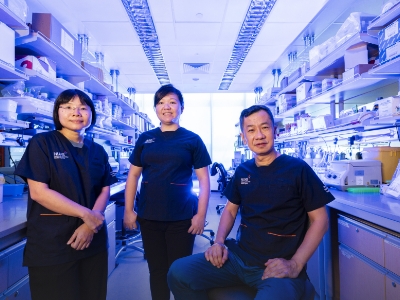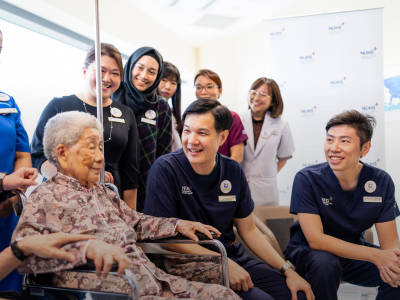Published on 13 December 2022
Geriatric Oncology emphasises the need for frailty assessment and an individualised, holistic approach to cancer management for the older patients.
“I think a lot of elderly still see cancer as a death sentence, and many receive the diagnosis with much pessimism,” said Dr Nydia Camelia, Consultant at the Division of Geriatric Medicine, Ng Teng Fong General Hospital (NTFGH).
This doesn’t need to be the case. “Advancements in cancer treatment have seen increased survival rates for patients with cancer in developed countries, such as Singapore. Cancer screening has also allowed for earlier detection and successful treatment of cancer. This encouraging trend is not limited to younger patients. It is seen in older patients as well,” she added.
The older we are, the higher the chances of developing cancer
Statistics show that cancer incidence increases exponentially with age. “With age, our cells have had more time to undergo damage, and problems with repairing these damages cause cancer. With increased life expectancy over the years, more individuals are expected to survive past their 80s, which is when the incidence rate of cancer is at its highest,” said Dr Camelia.
Geriatric oncology: Specialised cancer care for older adults that can address age-related issues
Ageing is a heterogeneous process and older persons of the same age can differ greatly in their functional health status. Functional age is a more accurate assessment of an older person’s overall health status as compared to age as a number alone, otherwise known as chronological age. The marriage of the two specialties allows doctors to assess an older patient’s functional age and prescribe treatment based on the individual’s fitness level. This makes cancer care individualised and multidimensional.
Polypharmacy is a unique challenge in the treatment of an older person. “Many older patients have concurrent chronic medical conditions, in addition to the cancer. Concurrent use of multiple drugs is therefore, not uncommon. As the body ages, the metabolism and elimination of these drugs are affected. This can further be influenced by cancer and cancer treatment, making the older person more susceptible to side effects,” explained Dr Camelia.
“Physical limitations and cognitive impairments can make the administration of certain treatments more challenging,” Dr Camelia added. Older patients with cognitive impairment such as dementia may not be able to understand their disease and the treatment prescribed.
They may also find remembering chemotherapy regime a challenge. Identifying a caregiver is vital to ensure that chemotherapy can be prescribed safely in these patients. Patients with complications from chronic diseases may also experience additive effects from their cancer treatment. For example, certain drugs used in chemotherapy can worsen pre-existing peripheral neuropathy from longstanding diabetes and worsen numbness in patient’s hands and feet. This can adversely affect their ability to carry out daily activities like cooking and showering. In some patients it can also increase their risk of falls.
“If an older patient’s fitness level is assessed before treatment is prescribed, their vulnerabilities can be addressed and interventions instituted early to ensure successful treatment with little adverse effects. Similarly, identifying their strengths will also help oncologists prescribe treatment they would otherwise be worried to offer based on advance chronological age alone,” explained Dr Camelia.
Thriving with cancer
Supported by JurongHealth Fund, the GOLDEN (Geriatric Oncology LongituDinal End to eNd) programme is a one-stop clinic for older adults diagnosed with cancer. The service provides individualised holistic cancer management to older persons in their cancer journey. Led by National University Cancer Institute, Singapore (NCIS) Geriatric Oncology team, the service is available at National University Hospital (NUH) and NTFGH.
Geriatric oncology aims to help the older person continue to have a fulfilling life and thrive with a cancer diagnosis. The aim of cancer management in your golden years is not limited to mere survival alone.
An older person’s fitness level greatly influences their tolerability to cancer treatment. The fitter you are, the better your overall outcomes. A person’s fitness level can be illustrated by a balance scale of vulnerability and resilience. Frailty occurs when the balance tips towards vulnerability.
Like saving money in a bank, that can be withdrawn later on for a rainy day, doctors recommend increasing the deposit in your “resilience bank” proactively, with good nutrition and physical exercise.
“Many people are familiar with physical rehabilitation, which is the restoration of physical function. Rehabilitation is reactive and occurs after a person’s physical function has deteriorated after an illness,” said Dr Camelia.
“Prehabilitation, however, involves improving the physical and psychological health of a person before the start of treatment. In cancer management, it is a pre-emptive step taken to build on a person’s functional reserves in anticipation of an intensive treatment like surgery or chemotherapy. This is especially important in the older person, many of whom are frail and have lower reserves, to begin with.”
150 minutes of moderate weekly activity has been shown to reduce your risk of getting colon, breast, uterine, lung and prostate cancer: a list which includes the most common cancers in men and women in Singapore. Even if you have been recently diagnosed with cancer, it is not too late to start. As your overall health increases, so will your cancer treatment outcomes.
“Prehabilitation is currently an adjunct to cancer management. However, we need to move towards it being an integral part of the holistic management of cancer, especially in older adults”, Dr Camelia added.
Dr Camelia also recommended having an honest discussion with older patients who have been diagnosed with cancer.
“Many family members are still hesitant to disclose a cancer diagnosis to their older loved ones because of the fear of them reacting adversely to the news,” said Dr Camelia.
“However, as well-intentioned as this may be, collusion can negatively affect the mental well-being of an older adult with cancer. Keeping them in the dark will likely make them more anxious and will not prevent them from still seeking answers.”
Indeed, this search for answers can lead these older patients down the road of misinformation, which can potentially cause undue emotional and mental distress.
“Often, these patients will seek these answers from peers, relatives or even online,” Dr Camelia elaborated. “They may be fed with misinformation that can perpetuate some of their unfound fears.
“Engaging them in the decision-making process, however, gives them a sense of control and helps to allay their anxiety. It allows them the opportunity to correct any misconceptions which can dispel unfounded fears.”
Written in consultation with Dr Nydia Camelia, Consultant, Division of Geriatric Medicine, Department of Medicine, NTFGH.



